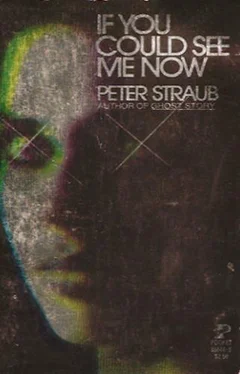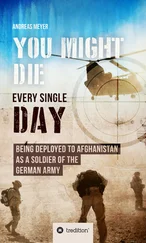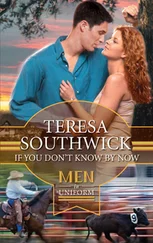The four men were across the street now, far up ahead, nearly to the bridge over the Blundell River. The courthouse lay about halfway between us. I began to walk toward it. The men had reached the bridge, and I saw them leaning on it, talking, lighting cigarettes. Bent over, moving as quickly as possible without running, I gained another fifty feet. Then one of the men threw down his cigarette and pointed at me.
I lifted my elbows and knees and discovered for the first time in my life what running was. It is rhythm, all rhythm, long easy beats made by coordinating every muscle. They were confused that I ran toward them, but when I reached the courthouse and turned easily on one leg and pounded, stepping high, to the back, they flew shouting after me. I fisted my hands and made arcs in the air with them, my chest bowed out and my legs sailing across the asphalt parking lot. I reached the police cars just as they came into the lot. I heard them slow down, scuffling, calling out to me.
The words were inaudible. A roaring sound kicked to life in the corner of the parking lot, and I saw a black-jacketed man tear off on a motorcycle. It looked as though it could have been Zack; I wasn’t sure. The sudden noise made my followers panic. By the time I reached the yellow door with thick glass inset above the word POLICE, they had scattered. My throat felt like burning paper.
The uniformed man rolling a sheet of paper into a typewriter turned his chubby face toward me. I closed the door and leaned back against it, breathing hard. Still holding the paper in his hands, he half-rose, and I saw the stumpy pistol strapped to his hip. “My name is Teagarden,” I said, “and I have an appointment with the Chief.”
“Oh yeah,” he said, and lowered the paper with deliberate slowness on top of the typewriter. My chest was heaving.
“I just won a race. Try not to shoot.”
“Just hold it right there.” He came around to the front of the desk, not taking his eyes from me nor removing his hand from within panic distance of the revolver. His left hand found the telephone; when he had the receiver to his ear, he glanced at the row of buttons at the base of the phone and punched one and then dialed a single number. “Teagarden’s here.” He set the phone down.
“You can go right in. He’s been waiting for you. Take that door right there, and then it’s the door marked Chief.”
I nodded, and moved toward the door “right there.” Polar Bears’ office was at the end of the hall; it was about ten by twelve, mostly filled with green filing cabinets and a worn old desk. Most of the rest of it was filled by Polar Bears.
“Sit down, for God’s sake, Miles,” he said, waving at the chair before his desk. “You look like you had a hard old day.” Looking at him, I could see the difference in our ages more clearly than I ever had before — he had been nearly Duane’s age, though his cheerful rowdiness had made him younger in my eyes. In this solidly massive man with a serious square face I could see few traces of the boy who had spitballed Bertilsson’s sheep. Even the reason for his name had vanished: his furry cap of astonishingly white hair had darkened and receded to a brownish dusting from his ears to his rubbery-looking scalp.
“You look like you’ve had a hard old life, but it’s nice to see you again,” I said.
“Yeah, we had some good times together, didn’t we? Some real good times.”
“I had an especially good time on the way over here. A gang of your citizens chased me with baseball bats. I barely made it.”
He tilted his head back and pushed his lips out. “Would that be the reason you’re sort of late for our reunion?”
“Our reunion is the reason I’m here at all, and not broken up in the alley behind Freebo’s. They only stopped chasing me because I made it into your parking lot.”
“You were at Freebo’s. I’d say you spent quite a time in there.”
“Does that mean you don’t believe me?”
“Some of the bucks around town are getting all riled. I can believe you, Miles. I don’t suppose you saw these boys close enough to identify them.”
“I was trying hard not to get that close.”
“Simmer down, Miles. They’re not going to get you. You’re going to be safe in here, having a little talk. Just simmer down. Those boys will leave you alone.”
“Some others of your local boys threw rocks at me this noon when my back was turned.”
“Is that so? You get hurt any?”
“It’s so and no, I didn’t. Do you want me to forget about that too? Just because they didn’t dent my skull?”
“I don’t want you to go getting yourself worked up over a bunch of hotheads. I’d say that some of the good people decided that you’d be better off leaving town.”
“Why?”
“Because they don’t know you, Miles. It’s simple as that. You’re the only man in about a century and a half had a sermon preached about him. You weren’t thinking of being run off, were you?”
“No. I have to stay here. I’m involved in something.”
“Um hum. Real good. Any idea how long that might take you?”
“Until the twenty-first. After that I don’t know.”
“Well, that’s not far away. I want to ask you to consider staying up there at Duane’s until we get some things straightened out around here. Is that all right?”
“What the hell is this all about, Polar Bears? Don’t leave town until the police give me permission?”
“I wouldn’t put it like that. I’m asking you for a favor.”
“Am I being questioned?”
“Hell no, Miles. We’re having a talk. I want your help on something.”
I leaned back in the stiff chair. I couldn’t feel the alcohol any more. Galen Hovre was regarding me with a half-smile which held little warmth. My senses were confirming a theory of mine, that when a man’s nature changes his essential smell changes with it. Polar Bears once had carried a dense, pleasant odor of closely packed earth, strongest when he was racing a jalopy at seventy down the curves of Highway 93 or stuffing a mailbox with rocks; now, like Duane, he smelled of gunpowder.
“Can I count on your help?”
I looked at this large square-faced man who had been my friend, and didn’t trust a thing he said. “Sure.”
“You’ve heard about these girls who were killed. Gwen Olson and Jenny Strand. Your neighbor Red Sunderson found that Strand girl, and she wasn’t a pretty sight. My deputy, Dave Lokken out there, lost his cookies when he saw her.”
“He’s still upset,” I said.
“Any normal man would be,” Hovre said amiably. “Truth is, we’re all upset around here. This crazy son of a bitch is still walking around. He could be anybody, and that’s the one that gets them by the nuts, Miles. We pretty well know everybody, and folks don’t know what to think.”
“Don’t you have any ideas about who it might be?”
“Oh, we’re sort of keeping an eye on someone, but even he’s not very likely, according to the way I see it. Now I’d like to keep this local. I’ve been Chief here for four years, and I want to get reelected so I can keep my family in hamburgers. Now you’re new around here. You might see things we don’t notice. You had a good education, you’re observant. I wonder if you’ve seen or heard anything that might help me out?”
“Wait a second,” I said. “Do those people who chased me think I did those things? Those killings?”
“You’d have to ask them.”
“Christ,” I said. “I’ve scarcely even thought about them. I’ve been busy with my own problems. I didn’t come here for this.”
“Seems to me it might help you out too if you could think of anything.”
“I shouldn’t need that. I shouldn’t have to help myself that way.”
Читать дальше












